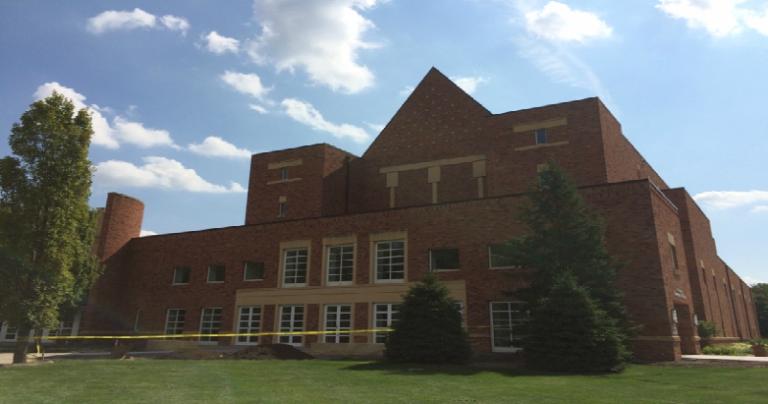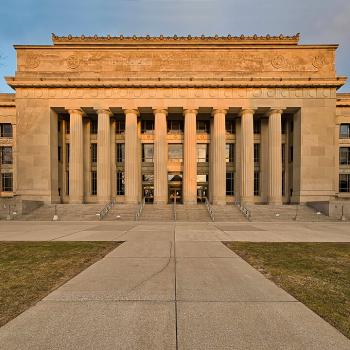Dear madam or sir,
I write in hope that you exist. Honestly, it’s hard for me to imagine that there are individuals in this or any society who have the ability to donate $75 million to their favorite good cause. (Subtract a few zeroes and I’d still need to battle my budget a bit.) But as you may have heard, Johns Hopkins University just announced a pledge in that amount from investor Bill Miller.
Now, I work in a very different sector of higher education from the one occupied by Johns Hopkins, a venerable research university that is private, but unaffiliated with any religious tradition or group. But even here in the world of private religious higher ed, I don’t need to look very far to find such generosity. Just last year, two of Bethel’s church-related peers on the Minnesota Private College Council announced eight-figure gifts: St. Thomas, a diocesan Catholic university, received $50 million to endow scholarships for business students; and Gustavus Adolphus, a college of the Evangelical Lutheran Church in America, got $40 million for scholarships, general endowment, and expanding and renovating a sciences building.
So I write in hope that you are out there: someone whose means far, far exceed my own, yet shares my deep commitment to the mission of Christian higher education.
These are challenging times for that sector. In part because we don’t have the endowment of a St. Thomas or a Gustavus, let alone a Johns Hopkins, Bethel and most of its peers remain almost entirely dependent on the ability of students and their families to pay tuition plus room and board. But while we’ve made significant efforts to reduce our costs, at the end of the day it’s clear to me that there is no way to fulfill our mission (at least at the traditional undergraduate level) apart from a high-touch, high-cost model that depends on highly skilled, highly trained professionals whose time is divided between teaching relatively small numbers of students and engaging in research on the cutting edges of their fields. (Then add in the expenses required for all the co-curricular programs and amenities that families expect of a residential version of this model of education.)
So we have little choice but to adapt to the changing desires and needs of two markets: first, the prospective and continuing students we’re tempted to treat as nothing more than consumers; second, the for-profit, non-profit, and public employers who will hire our students after graduation.
And at some level, we should respond to such markets, changeable as they are. And not just for pragmatic reasons. A university that centers itself on Jesus Christ must fulfill his mission, which means that we must ever always be in the turbulent world that God so loved to the point of sending it his Son.
But equally, we must not be fully or chiefly of that world.
If we are a Christian liberal arts university, we must be primarily concerned with asking timeless questions whose answers — however hard to see — ultimately lead back to the One who was, is, and will always be “the way, and the truth, and the life.”
Ultimately, we are seeking after the permanent things of God, and only penultimately after the impermanent things of the market.
So if you are compelled by that project, see how fragile it is in our present economy, and have the capacity to make a transformative gift in support of it, let me be so bold as to make two suggestions for how you designate your donation or pledge:
1. Give preference to the arts, humanities, and sciences
Our university, like most others of its kind, has long since decided that it needs to offer professional programs. I’ll trust that those programs arise from the intersection of our mission and the needs of the world. But they are not at the core of our identity as a Christian liberal arts university. If the needs they serve disappear (or can be met as effectively in other ways), then those programs can disappear and we will still be able to form whole and holy persons who serve out of love of God and neighbor.
Conversely, because such programs are supposed to meet the felt needs of the private, public, or other sectors, they should have a far easier time recruiting tuition-payers and attracting other revenue streams. (Admittedly, this is far less true of programs like social work, education, and perhaps health professions, which clearly align with our mission but whose value as a public good is not always recognized in our society.)
So let me suggest that you instead turn your attention to the disciplines that constitute the core of any liberal arts institution: the arts, humanities, and sciences.
Of course, this is precisely the focus that made Miller’s gift to Johns Hopkins so noteworthy. Though he accumulated his wealth as an investor, he didn’t pledge $75 million of it towards a business program. Nor health sciences (what might first come to mind with that school). Instead, he designated that amount for the philosophy department, telling reporters that “I attribute much of my business success to the analytical training and habits of mind that were developed when I was a graduate student at Johns Hopkins” studying philosophy. (He stopped short of finishing his dissertation.)
Likewise, I’d strongly encourage you to start with philosophy, the other humanities, the arts, and the social sciences, precisely because the gap between how they’re valued by the market and how central they are to our mission has never been greater. Everyone with any intellectual honesty will tell you that our institutions can’t possibly do what they’re supposed to do without teachers and students engaged in disciplines like philosophy, history, literature and languages, rhetoric, theology and biblical studies, art, music, theater, political science, sociology and anthropology, geography, and economics.
(And also mathematics and the natural and behavioral sciences. They’re essential, and I wish them to thrive, which isn’t always easy to accomplish in religious settings. But in general, those shifting market currents I mentioned above currently favor those disciplines, if only because they wrap up technology and engineering in the bundle we call STEM. So I certainly wouldn’t be dismayed to learn of a donor like yourself making possible, say, a new building for our chemists, physicists, and biologists. But if you’re going to make that gift, please attach a string that ensures that the money truly serves the sciences themselves, and not just whatever applications of those sciences are temporarily prized by a fickle market.)
However “Christian” you make it sound, there is no ultimate meaning to an education whose primary aim is to send out people equipped for a market… yet utterly unequipped to question the values and practices of that market, to adapt to its changes, to value the people and things that it neglects, or to see purpose in their work and everything they do beyond it.
Once upon a time, I held out hope that the church itself could help us close the gap between our missional core and what’s valued by the market. But it’s clear that most denominations and congregations are not going to prioritize Christian higher ed as they struggle with their own scarcities.
So I appeal to you as an individual member of that Body: if you believe in our mission and have the ability to make a gift, look beyond the fields of study privileged at this time and invest in the fields of study that are meaningful at all times.
2. Give preference to people, not buildings
Our university, like every other that has been around for any decent length of time, needs to improve and perhaps expand its facilities. Or so we’re told.
I’ll admit: it’s harder for me, a history professor, to see the benefit of engaging in the infrastructural equivalent of an arms race. I’ve taught in our best and worst classrooms, in every building on campus, and even (every other year) in the town squares and open fields of Europe. Give me committed, passionate students, and I think I can teach history wherever you put me.
That said, I know that things are different for my colleagues whose disciplines simply require certain spaces and equipment that quickly wear out or grow obsolete. So it’s no doubt important that Christian colleges and universities join their peers in seeking funds (from individual donors like you, but also from corporations, foundations, and governments) to meet the needs of sciences, engineering, medical fields, media production, finance, and other specialized programs.

But again: if our mission is about permanent things, we ought not to care too much about impermanent things like buildings and devices. If our mission is in service of the eternal, we ought to invest more heavily in those creatures who are made in the image of the divine and whose immortal souls are being crafted through the transformational education that we claim makes them into “whole and holy persons.”
So consider endowing scholarships. Make it possible for at least a few students to come to their school of choice and pursue the studies that most closely align with their gifts, passions, and calling. Free them of the lifelong burden of feeling like they need to deny their vocation in order to maximize their salary and minimize their debt.
Or endow faculty chairs. Make it possible for at least a few professors to do their work — as teachers and scholars — without living in perpetual anxiety about how many students are taking their classes or how hard it is to demonstrate the practical value of their research. Make it possible for universities to keep their core disciplines somewhat insulated from the market pressures that tempt us away from our mission.
Miller’s gift to Johns Hopkins’ philosophy department, for example, will endow nine chairs, allow for the near-doubling of the philosophy faculty, and help graduate students and postdoctoral fellows continue their work.
If you’re in a position to do something at all similar to that… I’m not asking for a $75 million gift to the Bethel University Department of History. (Though I wouldn’t turn it away. Our development folks can be found here. Or email me to schedule a time to talk — believe it or not, I can say much more than what I’ve written here!)
Pick five such schools, or fifteen, and make smaller, still-transformative gifts that will allow them to fulfill their mission long into the 21st century. You will change the lives of students, and through them the world.
Thank you for reading. May God bless you with grace and peace, with wisdom and discernment.
Chris Gehrz
Professor of History
Bethel University
St. Paul, Minnesota
Reposted from The Pietist Schoolman












